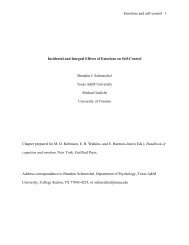A cognitive control perspective of self-control strength - ResearchGate
A cognitive control perspective of self-control strength - ResearchGate
A cognitive control perspective of self-control strength - ResearchGate
You also want an ePaper? Increase the reach of your titles
YUMPU automatically turns print PDFs into web optimized ePapers that Google loves.
190 A Cognitive Control Perspective<br />
influences (Bargh & Chartrand, 1999). Conversely, the recent social <strong>cognitive</strong> emphasis<br />
on <strong>self</strong>-<strong>control</strong> processes (Baumeister & Vohs, 2004) arguably borrows from prior<br />
<strong>cognitive</strong> research on executive <strong>control</strong> (Posner & Raichle, 1994) and <strong>cognitive</strong> <strong>control</strong><br />
(Rabbitt, 1979) processes. For this reason, there is likely an intimate potential relationship<br />
between social and <strong>cognitive</strong> <strong>perspective</strong>s <strong>of</strong> how top-down <strong>control</strong> operates, an integrative<br />
potential that is systematically reviewed in our paper.<br />
The Strength-Based Perspective <strong>of</strong> Self-Control<br />
Baumeister, Heatherton, and Tice (1994) first suggested that multiple problematic outcomes<br />
<strong>of</strong> both social and clinical significance – among them, addiction, aggression,<br />
criminality, overeating, and gambling – could be understood in terms <strong>of</strong> failures <strong>of</strong> <strong>self</strong><strong>control</strong>.<br />
This review, and other early work in the area, gave rise to a set <strong>of</strong> interlinked<br />
hypotheses. First, the <strong>self</strong>’s ability to <strong>control</strong> problematic outcomes is not unlimited in<br />
nature; rather, it is limited. Second, variations in <strong>self</strong>-<strong>control</strong> <strong>strength</strong>, both across individuals<br />
and across social occasions, are critical to understanding whether <strong>self</strong>-<strong>control</strong><br />
operations will be successful or unsuccessful. Third, exercising <strong>self</strong>-<strong>control</strong> should<br />
undermine subsequent efforts after <strong>self</strong>-<strong>control</strong>, much as the extensive use <strong>of</strong> a muscle<br />
renders it fatigued (Muraven & Baumeister, 2000). Fourth, if there is a common <strong>self</strong><strong>control</strong><br />
resource used for multiple purposes (Baumeister et al., 1994), even very different<br />
efforts after <strong>self</strong>-<strong>control</strong> (e.g., suppressing an emotional expression, then persisting<br />
on an unsolvable task) should mutually inhibit each other if the time interval between<br />
them is short.<br />
In support <strong>of</strong> such hypotheses, individuals have been randomly assigned to a first task<br />
that either should or should not require use <strong>of</strong> limited-capacity <strong>self</strong>-<strong>control</strong> resources<br />
(Muraven & Baumeister, 2000). Consistent with predictions, it has been found that depleting<br />
<strong>self</strong>-<strong>control</strong> by a first task results in lesser <strong>self</strong>-<strong>control</strong> in a second, <strong>of</strong>ten unrelated task.<br />
Impressive generalization has occurred across multiple first tasks (Baumeister, Muraven, &<br />
Tice, 2000) and multiple dependent measures, in the latter case including objective measures<br />
<strong>of</strong> intellectual performance (Schmeichel, Vohs, & Baumeister, 2003), abilities to<br />
make favorable social impressions (Vohs, Baumeister, & Ciarocco, 2005), and tendencies<br />
toward physical aggression (DeWall, Baumeister, Stillman, & Gailliot, 2007). Self-<strong>control</strong><br />
depletion, in other words, is quite problematic to subsequent functioning (Schmeichel &<br />
Baumeister, 2004).<br />
Cognitive Control Processes<br />
Self-<strong>control</strong> <strong>strength</strong> has been conceptualized in terms <strong>of</strong> momentarily available <strong>self</strong>-<strong>control</strong><br />
resources and depletion effects have been similarly conceptualized (Baumeister et al.,<br />
2000). Resource-based views <strong>of</strong> human cognition and behavior have been surprisingly<br />
difficult to operationalize and verify, however (Pashler, 1998). We can reiterate here that<br />
very extreme manipulations <strong>of</strong> sleep deprivation and tedium – which should deplete <strong>self</strong><strong>control</strong><br />
to the extreme as well – have resulted in surprisingly small performance deficits<br />
among task-motivated individuals (Sanders, 1998). In other words, <strong>cognitive</strong> analyses <strong>of</strong><br />
resources and their depletion have resulted in somewhat <strong>of</strong> an explanatory dead end<br />
(Navon, 1984). Invoking the idea <strong>of</strong> resources might or might not be similarly problematic<br />
in understanding <strong>self</strong>-<strong>control</strong> <strong>strength</strong> processes and we do consider a recent demonstration<br />
that <strong>self</strong>-<strong>control</strong> <strong>strength</strong> covaries with blood glucose levels (Gailliot et al., 2007)<br />
in a later section <strong>of</strong> the paper.<br />
ª 2010 The Authors Social and Personality Psychology Compass 4/3 (2010): 189–200, 10.1111/j.1751-9004.2009.00244.x<br />
Journal Compilation ª 2010 Blackwell Publishing Ltd



